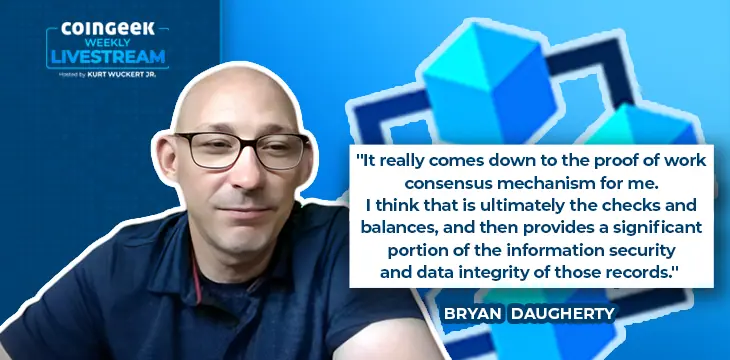|
Getting your Trinity Audio player ready...
|
SmartLedger Chairman and CERTIHASH CEO Bryan Daugherty joined Kurt Wuckert Jr. on the CoinGeek Weekly Livestream to discuss cybersecurity and how blockchain can enhance it. Check it out via the link below or read a full written summary.
What happened with CrowdStrike?
The cybersecurity outage caused by CrowdStrike’s botched update in July is the biggest event in cybersecurity in a long time. Wuckert asks Daugherty for his take on what happened and whether it may be related to other incidents, like Joe Biden’s resignation and the attempted assassination of Trump.
Daugherty says he can’t pull those strings together directly, but he does know that CrowdStrike is one of the top cybersecurity firms and works with many prestigious companies. It is strange that they pushed an update at 02:00 on a Friday, and they should have followed strict, certified protocols to prevent such incidents from occurring.
Is there a group in control of our networks? It’s possible, and that goes to the heart of the main problem in cybersecurity today: it takes 292 days to detect a network breach. That’s too long, and that’s one of the problems Sentinel Node solves. We need much faster detection, and we need to incentivize honesty. The reputational damage, fines, and other consequences currently incentivize coverups and obfuscation.
What does using blockchain in the cybersecurity stack look like in practice?
Daugherty says that’s a tough question, but essentially, it’s the foundation for secure communication. Combined with TCP (Transmission Control Protocol), it makes much more secure data packet transmission possible. Combined with decentralized record storage, this can revolutionize cybersecurity.
Eventually, Daugherty believes companies like CrowdStrike and even his own will become unnecessary. Right now, they’re required to be between people and their data by necessity, but as a greater understanding of blockchain proliferates, governments and larger players will develop their own solutions. There’ll still be room for companies like CERTIHASH to serve smaller companies that don’t have the expertise, but the big ones will pull away and eliminate the need for third parties.
What is Sentinel Node? It’s a tool designed to bring down detection time for network intrusions. It takes a snapshot of the state of a computer network every 10 seconds and stores it on the blockchain, but that could be reduced to milliseconds. Education is catching up to blockchain innovation, and finally, people are beginning to realize the value of these tools. That said, it’s still up to blockchain innovators to demonstrate the value proposition of their tools.
Is old data always going to be a problem?
Wuckert points out that, by now, we all have a long data trail behind us, and even very old data is sitting on a server somewhere and can be breached. Is this always going to be a problem?
Daugherty jokes that an EMP or massive cyberattack could wipe out the data records. However, there’s also the possibility that new, innovative tools can be developed to help. Right now, large companies dictate what technology governments take up, but that could change as small companies shake things up. It’s also up to us as Internet users to be more mindful of what we share.
Has IBM adopted CERTIHASH tools in-house?
Daugherty answers that they were extremely impressed with the tools when they were developed. They wanted to work with IBM (NASDAQ: IBM) both to educate them on the technology and to be associated with their brand.
CERTIHASH reminds me of an airplane’s black box. Is that a fair way to think of it?
Daugherty agrees that these tools can provide a lot of forensic intelligence. This information allows you to better understand the breach and the actions taken, which have consequences for insurance, among other things.
Why did CERTIHASH use the BSV blockchain as opposed to a third-party solution like DigiCert?
For Daugherty, it’s all about the proof of work (PoW). It provides the checks, balances, and greater security of records. The data integrity provided by PoW is unrivaled.
Watch: Cybersecurity fundamentals in today’s digital age with AI & Web3

 08-29-2025
08-29-2025 





